Fleurs du Mal Magazine


Or see the index
The Sorrows of Young Werther (24) by J.W. von Goethe ♦ JULY 30.  Albert is arrived, and I must take my departure. Were he the best and noblest of men, and I in every respect his inferior, I could not endure to see him in possession of such a perfect being. Possession!–enough, Wilhelm: her betrothed is here,–a fine, worthy fellow, whom one cannot help liking. Fortunately I was not present at their meeting. It would have broken my heart! And he is so considerate: he has not given Charlotte one kiss in my presence. Heaven reward him for it! I must love him for the respect with which he treats her. He shows a regard for me, but for this I suspect I am more indebted to Charlotte than to his own fancy for me. Women have a delicate tact in such matters, and it should be so. They cannot always succeed in keeping two rivals on terms with each other; but, when they do, they are the only gainers.
Albert is arrived, and I must take my departure. Were he the best and noblest of men, and I in every respect his inferior, I could not endure to see him in possession of such a perfect being. Possession!–enough, Wilhelm: her betrothed is here,–a fine, worthy fellow, whom one cannot help liking. Fortunately I was not present at their meeting. It would have broken my heart! And he is so considerate: he has not given Charlotte one kiss in my presence. Heaven reward him for it! I must love him for the respect with which he treats her. He shows a regard for me, but for this I suspect I am more indebted to Charlotte than to his own fancy for me. Women have a delicate tact in such matters, and it should be so. They cannot always succeed in keeping two rivals on terms with each other; but, when they do, they are the only gainers.
I cannot help esteeming Albert. The coolness of his temper contrasts strongly with the impetuosity of mine, which I cannot conceal. He has a great deal of feeling, and is fully sensible of the treasure he possesses in Charlotte. He is free from ill-humour, which you know is the fault I detest most.
He regards me as a man of sense; and my attachment to Charlotte, and the interest I take in all that concerns her, augment his triumph and his love. I shall not inquire whether he may not at times tease her with some little jealousies; as I know, that, were I in his place, I should not be entirely free from such sensations.
But, be that as it may, my pleasure with Charlotte is over. 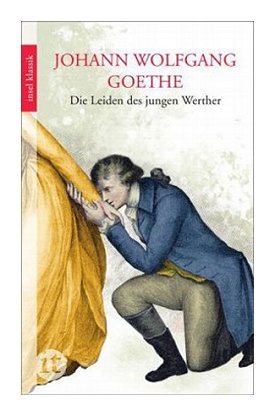 Call it folly or infatuation, what signifies a name? The thing speaks for itself. Before Albert came, I knew all that I know now. I knew I could make no pretensions to her, nor did I offer any, that is, as far as it was possible, in the presence of so much loveliness, not to pant for its enjoyment. And now, behold me like a silly fellow, staring with astonishment when another comes in, and deprives me of my love.
Call it folly or infatuation, what signifies a name? The thing speaks for itself. Before Albert came, I knew all that I know now. I knew I could make no pretensions to her, nor did I offer any, that is, as far as it was possible, in the presence of so much loveliness, not to pant for its enjoyment. And now, behold me like a silly fellow, staring with astonishment when another comes in, and deprives me of my love.
I bite my lips, and feel infinite scorn for those who tell me to be resigned, because there is no help for it. Let me escape from the yoke of such silly subterfuges! I ramble through the woods; and when I return to Charlotte, and find Albert sitting by her side in the summer-house in the garden, I am unable to bear it, behave like a fool, and commit a thousand extravagances. “For Heaven’s sake,” said Charlotte today, “let us have no more scenes like those of last night! You terrify me when you are so violent.” Between ourselves, I am always away now when he visits her: and I feel delighted when I find her alone.
The Sorrows of Young Werther (Die Leiden des jungen Werther) by J.W. von Goethe. Translated by R.D. Boylan.
To be continued
fleursdumal.nl magazine for art & literature
More in: -Die Leiden des jungen Werther, Goethe, Johann Wolfgang von
 The Sorrows of Young Werther (23) by J.W. von Goethe ♦ JULY 25. Yes, dear Charlotte! I will order and arrange everything. Only give me more commissions, the more the better. One thing, however, I must request: use no more writing-sand with the dear notes you send me. Today I raised your letter hastily to my lips, and it set my teeth on edge.
The Sorrows of Young Werther (23) by J.W. von Goethe ♦ JULY 25. Yes, dear Charlotte! I will order and arrange everything. Only give me more commissions, the more the better. One thing, however, I must request: use no more writing-sand with the dear notes you send me. Today I raised your letter hastily to my lips, and it set my teeth on edge.
JULY 26. I have often determined not to see her so frequently. But who could keep such a resolution? Every day I am exposed to the temptation, and promise faithfully that to-morrow I will really stay away: but, when tomorrow comes, I find some irresistible reason for seeing her; and, before I can account for it, I am with her again. Either she has said on the previous evening “You will be sure to call to-morrow,”–and who could stay away then?–or she gives me some commission, and I find it essential to take her the answer in person; or the day is fine, and I walk to Walheim; and, when I am there, it is only half a league farther to her. I am within the charmed atmosphere, and soon find myself at her side. My grandmother used to tell us a story of a mountain of loadstone. When any vessels came near it, they were instantly deprived of their ironwork: the nails flew to the mountain, and the unhappy crew perished amidst the disjointed planks.
The Sorrows of Young Werther (Die Leiden des jungen Werther) by J.W. von Goethe. Translated by R.D. Boylan.
To be continued
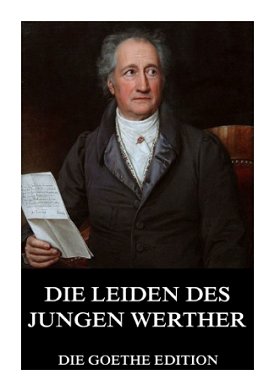
fleursdumal.nl
More in: -Die Leiden des jungen Werther, Goethe, Johann Wolfgang von
 The Sorrows of Young Werther (22) by J.W. von Goethe ♦ JULY 20. I cannot assent to your proposal that I should accompany the ambassador to ——. I do not love subordination; and we all know that he is a rough, disagreeable person to be connected with. You say my mother wishes me to be employed. I could not help laughing at that. Am I not sufficiently employed? And is it not in reality the same, whether I shell peas or count lentils? The world runs on from one folly to another; and the man who, solely from regard to the opinion of others, and without any wish or necessity of his own, toils after gold, honour, or any other phantom, is no better than a fool.
The Sorrows of Young Werther (22) by J.W. von Goethe ♦ JULY 20. I cannot assent to your proposal that I should accompany the ambassador to ——. I do not love subordination; and we all know that he is a rough, disagreeable person to be connected with. You say my mother wishes me to be employed. I could not help laughing at that. Am I not sufficiently employed? And is it not in reality the same, whether I shell peas or count lentils? The world runs on from one folly to another; and the man who, solely from regard to the opinion of others, and without any wish or necessity of his own, toils after gold, honour, or any other phantom, is no better than a fool.
JULY 24. You insist so much on my not neglecting my drawing, that it would be as well for me to say nothing as to confess how little I have lately done.
 I never felt happier, I never understood nature better, even down to the veriest stem or smallest blade of grass; and yet I am unable to express myself: my powers of execution are so weak, everything seems to swim and float before me, so that I cannot make a clear, bold outline. But I fancy I should succeed better if I had some clay or wax to model. I shall try, if this state of mind continues much longer, and will take to modelling, if I only knead dough.
I never felt happier, I never understood nature better, even down to the veriest stem or smallest blade of grass; and yet I am unable to express myself: my powers of execution are so weak, everything seems to swim and float before me, so that I cannot make a clear, bold outline. But I fancy I should succeed better if I had some clay or wax to model. I shall try, if this state of mind continues much longer, and will take to modelling, if I only knead dough.
I have commenced Charlotte’s portrait three times, and have as often disgraced myself. This is the more annoying, as I was formerly very happy in taking likenesses. I have since sketched her profile, and must content myself with that.
The Sorrows of Young Werther (Die Leiden des jungen Werther) by J.W. von Goethe. Translated by R.D. Boylan.
To be continued
fleursdumal.nl magazine for art & literature
More in: -Die Leiden des jungen Werther, Goethe, Johann Wolfgang von
The Sorrows of Young Werther (21) by J.W. von Goethe
JULY 18.  Wilhelm, what is the world to our hearts without love? What is a magic-lantern without light? You have but to kindle the flame within, and the brightest figures shine on the white wall; and, if love only show us fleeting shadows, we are yet happy, when, like mere children, we behold them, and are transported with the splendid phantoms. I have not been able to see Charlotte to-day. I was prevented by company from which I could not disengage myself. What was to be done? I sent my servant to her house, that I might at least see somebody to-day who had been near her. Oh, the impatience with which I waited for his return! the joy with which I welcomed him! I should certainly have caught him in my arms, and kissed him, if I had not been ashamed.
Wilhelm, what is the world to our hearts without love? What is a magic-lantern without light? You have but to kindle the flame within, and the brightest figures shine on the white wall; and, if love only show us fleeting shadows, we are yet happy, when, like mere children, we behold them, and are transported with the splendid phantoms. I have not been able to see Charlotte to-day. I was prevented by company from which I could not disengage myself. What was to be done? I sent my servant to her house, that I might at least see somebody to-day who had been near her. Oh, the impatience with which I waited for his return! the joy with which I welcomed him! I should certainly have caught him in my arms, and kissed him, if I had not been ashamed.
It is said that the Bonona stone, when placed in the sun, attracts the rays, and for a time appears luminous in the dark. So was it with me and this servant. The idea that Charlotte’s eyes had dwelt on his countenance, his cheek, his very apparel, endeared them all inestimably to me, so that at the moment I would not have parted from him for a thousand crowns. His presence made me so happy! Beware of laughing at me, Wilhelm. Can that be a delusion which makes us happy?
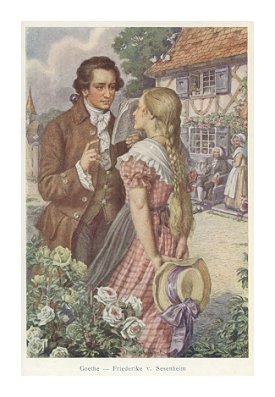
JULY 19. “I shall see her today!” I exclaim with delight, when I rise in the morning, and look out with gladness of heart at the bright, beautiful sun. “I shall see her today!” And then I have no further wish to form: all, all is included in that one thought.
The Sorrows of Young Werther (Die Leiden des jungen Werther) by J.W. von Goethe. Translated by R.D. Boylan.
To be continued
fleursdumal.nl magazine for art & literature
More in: -Die Leiden des jungen Werther, Goethe, Johann Wolfgang von

The Sorrows of Young Werther (20)
by J.W. von Goethe
JULY 16.
How my heart beats when by accident I touch her finger, or my feet meet hers under the table! I draw back as if from a furnace; but a secret force impels me forward again, and my senses become disordered.
Her innocent, unconscious heart never knows what agony these little familiarities inflict upon me. Sometimes when we are talking she lays her hand upon mine, and in the eagerness of conversation comes closer to me, and her balmy breath reaches my lips,–when I feel as if lightning had struck me, and that I could sink into the earth. And yet, Wilhelm, with all this heavenly confidence,–if I know myself, and should ever dare–you understand me. No, no! my heart is not so corrupt, it is weak, weak enough but is not that a degree of corruption?
She is to me a sacred being. All passion is still in her presence: I cannot express my sensations when I am near her. I feel as if my soul beat in every nerve of my body. There is a melody which she plays on the piano with angelic skill,–so simple is it, and yet so spiritual! It is her favourite air; and, when she plays the first note, all pain, care, and sorrow disappear from me in a moment.
I believe every word that is said of the magic of ancient music. How her simple song enchants me! Sometimes, when I am ready to commit suicide, she sings that air; and instantly the gloom and madness which hung over me are dispersed, and I breathe freely again.
The Sorrows of Young Werther (Die Leiden des jungen Werther) by J.W. von Goethe. Translated by R.D. Boylan.
To be continued
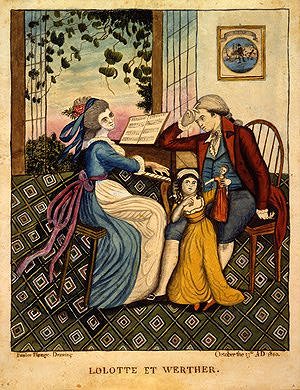
fleursdumal.nl magazine for art & literature
More in: -Die Leiden des jungen Werther, Goethe, Johann Wolfgang von

The Sorrows of Young Werther (19)
by J.W. von Goethe
JULY 13.
No, I am not deceived. In her dark eyes I read a genuine interest in me and in my fortunes. Yes, I feel it; and I may believe my own heart which tells me–dare I say it?–dare I pronounce the divine words?–that she loves me!
That she loves me! How the idea exalts me in my own eyes! And, as you can understand my feelings, I may say to you, how I honour myself since she loves me!
Is this presumption, or is it a consciousness of the truth? I do not know a man able to supplant me in the heart of Charlotte; and yet when she speaks of her betrothed with so much warmth and affection, I feel like the soldier who has been stripped of his honours and titles, and deprived of his sword.
The Sorrows of Young Werther (Die Leiden des jungen Werther) by J.W. von Goethe. Translated by R.D. Boylan.
To be continued
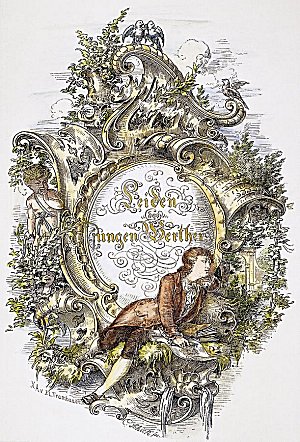
fleursdumal.nl magazine for art & literature
More in: -Die Leiden des jungen Werther, Goethe, Johann Wolfgang von

The Sorrows of Young Werther (18)
by J.W. von Goethe
JULY 11.
Madame M–is very ill. I pray for her recovery, because Charlotte shares my sufferings. I see her occasionally at my friend’s house, and to-day she has told me the strangest circumstance. Old M–is a covetous, miserly fellow, who has long worried and annoyed the poor lady sadly; but she has borne her afflictions patiently. A few days ago, when the physician informed us that her recovery was hopeless, she sent for her husband (Charlotte was present), and addressed him thus: “I have something to confess, which, after my decease, may occasion trouble and confusion. I have hitherto conducted your household as frugally and economically as possible, but you must pardon me for having defrauded you for thirty years. At the commencement of our married life, you allowed a small sum for the wants of the kitchen, and the other household expenses. When our establishment increased and our property grew larger, I could not persuade you to increase the weekly allowance in proportion: in short, you know, that, when our wants were greatest, you required me to supply everything with seven florins a week. I took the money from you without an observation, but made up the weekly deficiency from the money-chest; as nobody would suspect your wife of robbing the household bank. But I have wasted nothing, and should have been content to meet my eternal Judge without this confession, if she, upon whom the management of your establishment will devolve after my decease, would be free from embarrassment upon your insisting that the allowance made to me, your former wife, was sufficient.”
I talked with Charlotte of the inconceivable manner in which men allow themselves to be blinded; how any one could avoid suspecting some deception, when seven florins only were allowed to defray expenses twice as great. But I have myself known people who believed, without any visible astonishment, that their house possessed the prophet’s never-failing cruse of oil.
The Sorrows of Young Werther (Die Leiden des jungen Werther) by J.W. von Goethe. Translated by R.D. Boylan.
To be continued
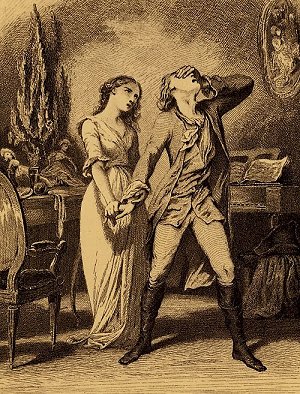
fleursdumal.nl magazine for art & literature
More in: -Die Leiden des jungen Werther, Goethe, Johann Wolfgang von

The Sorrows of Young Werther (17)
by J.W. von Goethe
JULY 8.
What a child is man that he should be so solicitous about a look! What a child is man! We had been to Walheim: the ladies went in a carriage; but during our walk I thought I saw in Charlotte’s dark eyes–I am a fool–but forgive me! you should see them,–those eyes.–However, to be brief (for my own eyes are weighed down with sleep), you must know, when the ladies stepped into their carriage again, young W. Seldstadt, Andran, and I were standing about the door. They are a merry set of fellows, and they were all laughing and joking together. I watched Charlotte’s eyes. They wandered from one to the other; but they did not light on me, on me, who stood there motionless, and who saw nothing but her! My heart bade her a thousand times adieu, but she noticed me not.
The carriage drove off; and my eyes filled with tears. I looked after her: suddenly I saw Charlotte’s bonnet leaning out of the window, and she turned to look back, was it at me? My dear friend, I know not; and in this uncertainty I find consolation. Perhaps she turned to look at me. Perhaps! Good-night–what a child I am!
JULY 10.
You should see how foolish I look in company when her name is mentioned, particularly when I am asked plainly how I like her. How I like her!
I detest the phrase. What sort of creature must he be who merely liked Charlotte, whose whole heart and senses were not entirely absorbed by her. Like her! Some one asked me lately how I liked Ossian.
The Sorrows of Young Werther (Die Leiden des jungen Werther) by J.W. von Goethe. Translated by R.D. Boylan.
To be continued
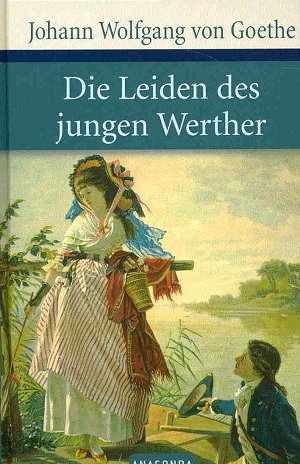
fleursdumal.nl magazine for art & literature
More in: -Die Leiden des jungen Werther, Goethe, Johann Wolfgang von

Johann Wolfgang von Goethe
(1749-1832)
Liebhaber in allen Gestalten
Ich wollt, ich wär ein Fisch,
So hurtig und frisch;
Und kämst du zu anglen,
Ich würde nicht manglen.
Ich wollt, ich wär ein Fisch,
So hurtig und frisch.
Ich wollt, ich wär ein Pferd,
Da wär ich dir wert.
O wär ich ein Wagen,
Bequem dich zu tragen.
Ich wollt, ich wär ein Pferd,
Da wär ich dir wert.
Ich wollt, ich wäre Gold,
Dir immer im Sold;
Und tätst du was kaufen,
Käm ich wieder gelaufen.
Ich wollt, ich wäre Gold,
Dir immer im Sold.
Ich wollt, ich wär treu,
Mein Liebchen stets neu;
Ich wollt mich verheißen,
Wollt nimmer verreisen.
Ich wollt, ich wär treu,
Mein Liebchen stets neu.
Ich wollt, ich wär alt
Und runzlig und kalt;
Tätst du mir’s versagen,
Da könnt mich’s nicht plagen.
Ich wollt, ich wär alt
Und runzlig und kalt.
Wär ich Affe sogleich,
Voll neckender Streich’;
Hätt was dich verdrossen,
So macht ich dir Possen.
Wär ich Affe sogleich,
Voll neckender Streich’.
Wär ich gut wie ein Schaf,
Wie der Löwe so brav;
Hätt Augen wie’s Lüchschen
Und Listen wie’s Füchschen.
Wär ich gut wie ein Schaf,
Wie der Löwe so brav.
Was alles ich wär,
Das gönnt ich dir sehr;
Mit fürstlichen Gaben,
Du solltest mich haben.
Was alles ich wär,
Das gönnt ich dir sehr.
Doch bin ich, wie ich bin,
Und nimm mich nur hin!
Willst du beßre besitzen,
So laß dir sie schnitzen.
Ich bin nun, wie ich bin;
So nimm mich nur hin!
Goethe poetry
fleursdumal.nl magazine
More in: Archive G-H, Goethe, Johann Wolfgang von

The Sorrows of Young Werther (16)
by J.W. von Goethe
JULY 6.
She is still with her dying friend, and is still the same bright, beautiful creature whose presence softens pain, and sheds happiness around whichever way she turns. She went out yesterday with her little sisters: I knew it, and went to meet them; and we walked together. In about an hour and a half we returned to the town. We stopped at the spring I am so fond of, and which is now a thousand times dearer to me than ever. Charlotte seated herself upon the low wall, and we gathered about her. I looked around, and recalled the time when my heart was unoccupied and free. “Dear fountain!” I said, “since that time I have no more come to enjoy cool repose by thy fresh stream: I have passed thee with careless steps, and scarcely bestowed a glance upon thee.” I looked down, and observed Charlotte’s little sister, Jane, coming up the steps with a glass of water. I turned toward Charlotte, and I felt her influence over me. Jane at the moment approached with the glass. Her sister, Marianne, wished to take it from her. “No!” cried the child, with the sweetest expression of face, “Charlotte must drink first.”
The affection and simplicity with which this was uttered so charmed me, that I sought to express my feelings by catching up the child and kissing her heartily. She was frightened, and began to cry. “You should not do that,” said Charlotte: I felt perplexed. “Come, Jane,” she continued, taking her hand, and leading her down the steps again, “it is no matter: wash yourself quickly in the fresh water.” I stood and watched them; and when I saw the little dear rubbing her cheeks with her wet hands, in full belief that all the impurities contracted from my ugly beard would be washed off by the miraculous water, and how, though Charlotte said it would do, she continued still to wash with all her might, as though she thought too much were better than too little, I assure you, Wilhelm, I never attended a baptism with greater reverence; and, when Charlotte came up from the well, I could have prostrated myself as before the prophet of an Eastern nation.
In the evening I would not resist telling the story to a person who, I thought, possessed some natural feeling, because he was a man of understanding. But what a mistake I made. He maintained it was very wrong of Charlotte, that we should not deceive children, that such things occasioned countless mistakes and superstitions, from which we were bound to protect the young. It occurred to me then, that this very man had been baptised only a week before; so I said nothing further, but maintained the justice of my own convictions. We should deal with children as God deals with us, we are happiest under the influence of innocent delusions.
The Sorrows of Young Werther (Die Leiden des jungen Werther) by J.W. von Goethe. Translated by R.D. Boylan.
To be continued
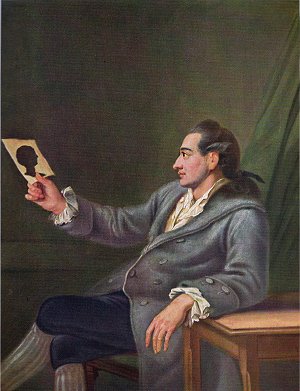
fleursdumal.nl magazine
More in: -Die Leiden des jungen Werther, Goethe, Johann Wolfgang von

The Sorrows of Young Werther (15)
by J.W. von Goethe
JULY 1.
The consolation Charlotte can bring to an invalid I experience from my own heart, which suffers more from her absence than many a poor creature lingering on a bed of sickness. She is gone to spend a few days in the town with a very worthy woman, who is given over by the physicians, and wishes to have Charlotte near her in her last moments. I accompanied her last week on a visit to the Vicar of S–, a small village in the mountains, about a league hence. We arrived about four o’clock: Charlotte had taken her little sister with her. When we entered the vicarage court, we found the good old man sitting on a bench before the door, under the shade of two large walnut-trees. At the sight of Charlotte he seemed to gain new life, rose, forgot his stick, and ventured to walk toward her. She ran to him, and made him sit down again; then, placing herself by his side, she gave him a number of messages from her father, and then caught up his youngest child, a dirty, ugly little thing, the joy of his old age, and kissed it. I wish you could have witnessed her attention to this old man,–how she raised her voice on account of his deafness; how she told him of healthy young people, who had been carried off when it was least expected; praised the virtues of Carlsbad, and commended his determination to spend the ensuing summer there; and assured him that he looked better and stronger than he did when she saw him last. I, in the meantime, paid attention to his good lady. The old man seemed quite in spirits; and as I could not help admiring the beauty of the walnut-trees, which formed such an agreeable shade over our heads, he began, though with some little difficulty, to tell us their history. “As to the oldest,” said he, “we do not know who planted it,–some say one clergyman, and some another: but the younger one, there behind us, is exactly the age of my wife, fifty years old next October; her father planted it in the morning, and in the evening she came into the world. My wife’s father was my predecessor here, and I cannot tell you how fond he was of that tree; and it is fully as dear to me. Under the shade of that very tree, upon a log of wood, my wife was seated knitting, when I, a poor student, came into this court for the first time, just seven and twenty years ago.”
Charlotte inquired for his daughter. He said she was gone with Herr Schmidt to the meadows, and was with the haymakers. The old man then resumed his story, and told us how his predecessor had taken a fancy to him, as had his daughter likewise; and how he had become first his curate, and subsequently his successor. He had scarcely finished his story when his daughter returned through the garden, accompanied by the above-mentioned Herr Schmidt. She welcomed Charlotte affectionately, and I confess I was much taken with her appearance. She was a lively-looking, good-humoured brunette, quite competent to amuse one for a short time in the country. Her lover (for such Herr Schmidt evidently appeared to be) was a polite, reserved personage, and would not join our conversation, notwithstanding all Charlotte’s endeavours to draw him out. I was much annoyed at observing, by his countenance, that his silence did not arise from want of talent, but from caprice and ill-humour. This subsequently became very evident, when we set out to take a walk, and Frederica joining Charlotte, with whom I was talking, the worthy gentleman’s face, which was naturally rather sombre, became so dark and angry that Charlotte was obliged to touch my arm, and remind me that I was talking too much to Frederica. Nothing distresses me more than to see men torment each other; particularly when in the flower of their age, in the very season of pleasure, they waste their few short days of sunshine in quarrels and disputes, and only perceive their error when it is too late to repair it. This thought dwelt upon my mind; and in the evening, when we returned to the vicar’s, and were sitting round the table with our bread end milk, the conversation turned on the joys and sorrows of the world, I could not resist the temptation to inveigh bitterly against ill-humour. “We are apt,” said I, “to complain, but–with very little cause, that our happy days are few, and our evil days many. If our hearts were always disposed to receive the benefits Heaven sends us, we should acquire strength to support evil when it comes.” “But,” observed the vicar’s wife, “we cannot always command our tempers, so much depends upon the constitution: when the body suffers, the mind is ill at ease.” “I acknowledge that,” I continued; “but we must consider such a disposition in the light of a disease, and inquire whether there is no remedy for it.”
“I should be glad to hear one,” said Charlotte: “at least, I think very much depends upon ourselves; I know it is so with me. When anything annoys me, and disturbs my temper, I hasten into the garden, hum a couple of country dances, and it is all right with me directly.” “That is what I meant,” I replied; “ill-humour resembles indolence: it is natural to us; but if once we have courage to exert ourselves, we find our work run fresh from our hands, and we experience in the activity from which we shrank a real enjoyment.” Frederica listened very attentively: and the young man objected, that we were not masters of ourselves, and still less so of our feelings. “The question is about a disagreeable feeling,” I added, “from which every one would willingly escape, but none know their own power without trial. Invalids are glad to consult physicians, and submit to the most scrupulous regimen, the most nauseous medicines, in order to recover their health.” I observed that the good old man inclined his head, and exerted himself to hear our discourse; so I raised my voice, and addressed myself directly to him. “We preach against a great many crimes,” I observed, “but I never remember a sermon delivered against ill-humour.” “That may do very well for your town clergymen,” said he: “country people are never ill-humoured; though, indeed, it might be useful, occasionally, to my wife for instance, and the judge.” We all laughed, as did he likewise very cordially, till he fell into a fit of coughing, which interrupted our conversation for a time. Herr Schmidt resumed the subject. “You call ill humour a crime,” he remarked, “but I think you use too strong a term.” “Not at all,” I replied, “if that deserves the name which is so pernicious to ourselves and our neighbours. Is it not enough that we want the power to make one another happy, must we deprive each other of the pleasure which we can all make for ourselves? Show me the man who has the courage to hide his ill-humour, who bears the whole burden himself, without disturbing the peace of those around him. No: ill-humour arises from an inward consciousness of our own want of merit, from a discontent which ever accompanies that envy which foolish vanity engenders. We see people happy, whom we have not made so, and cannot endure the sight.” Charlotte looked at me with a smile; she observed the emotion with which I spoke: and a tear in the eyes of Frederica stimulated me to proceed. “Woe unto those,” I said, “who use their power over a human heart to destroy the simple pleasures it would naturally enjoy! All the favours, all the attentions, in the world cannot compensate for the loss of that happiness which a cruel tyranny has destroyed.” My heart was full as I spoke. A recollection of many things which had happened pressed upon my mind, and filled my eyes with tears.
“We should daily repeat to ourselves,” I exclaimed, “that we should not interfere with our friends, unless to leave them in possession of their own joys, and increase their happiness by sharing it with them! But when their souls are tormented by a violent passion, or their hearts rent with grief, is it in your power to afford them the slightest consolation?
“And when the last fatal malady seizes the being whose untimely grave you have prepared, when she lies languid and exhausted before you, her dim eyes raised to heaven, and the damp of death upon her pallid brow, there you stand at her bedside like a condemned criminal, with the bitter feeling that your whole fortune could not save her; and the agonising thought wrings you, that all your efforts are powerless to impart even a moment’s strength to the departing soul, or quicken her with a transitory consolation.”
At these words the remembrance of a similar scene at which I had been once present fell with full force upon my heart. I buried my face in my handkerchief, and hastened from the room, and was only recalled to my recollection by Charlotte’s voice, who reminded me that it was time to return home. With what tenderness she chid me on the way for the too eager interest I took in everything! She declared it would do me injury, and that I ought to spare myself. Yes, my angel! I will do so for your sake.
The Sorrows of Young Werther (Die Leiden des jungen Werther) by J.W. von Goethe. Translated by R.D. Boylan.
To be continued
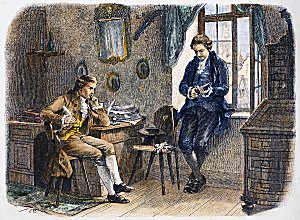
fleursdumal.nl magazine
More in: -Die Leiden des jungen Werther, Goethe, Johann Wolfgang von

The Sorrows of Young Werther (14)
by J.W. von Goethe
JUNE 29.
The day before yesterday, the physician came from the town to pay a visit to the judge. He found me on the floor playing with Charlotte’s children. Some of them were scrambling over me, and others romped with me; and, as I caught and tickled them, they made a great noise. The doctor is a formal sort of personage: he adjusts the plaits of his ruffles, and continually settles his frill whilst he is talking to you; and he thought my conduct beneath the dignity of a sensible man. I could perceive this by his countenance. But I did not suffer myself to be disturbed. I allowed him to continue his wise conversation, whilst I rebuilt the children’s card houses for them as fast as they threw them down. He went about the town afterward, complaining that the judge’s children were spoiled enough before, but that now Werther was completely ruining them.
Yes, my dear Wilhelm, nothing on this earth affects my heart so much as children. When I look on at their doings; when I mark in the little creatures the seeds of all those virtues and qualities which they will one day find so indispensable; when I behold in the obstinate all the future firmness and constancy of a noble character; in the capricious, that levity and gaiety of temper which will carry them lightly over the dangers and troubles of life, their whole nature simple and unpolluted,–then I call to mind the golden words of the Great Teacher of mankind, “Unless ye become like one of these!” And now, my friend, these children, who are our equals, whom we ought to consider as our models, we treat them as though they were our subjects. They are allowed no will of their own. And have we, then, none ourselves? Whence comes our exclusive right? Is it because we are older and more experienced?
Great God! from the height of thy heaven thou beholdest great children and little children, and no others; and thy Son has long since declared which afford thee greatest pleasure. But they believe in him, and hear him not,–that, too, is an old story; and they train their children after their own image, etc.
Adieu, Wilhelm: I will not further bewilder myself with this subject.
The Sorrows of Young Werther (Die Leiden des jungen Werther) by J.W. von Goethe. Translated by R.D. Boylan.
To be continued
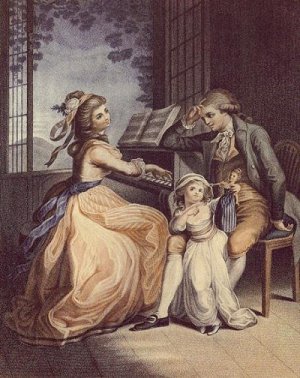
fleursdumal.nl magazine
More in: -Die Leiden des jungen Werther, Goethe, Johann Wolfgang von
Thank you for reading Fleurs du Mal - magazine for art & literature